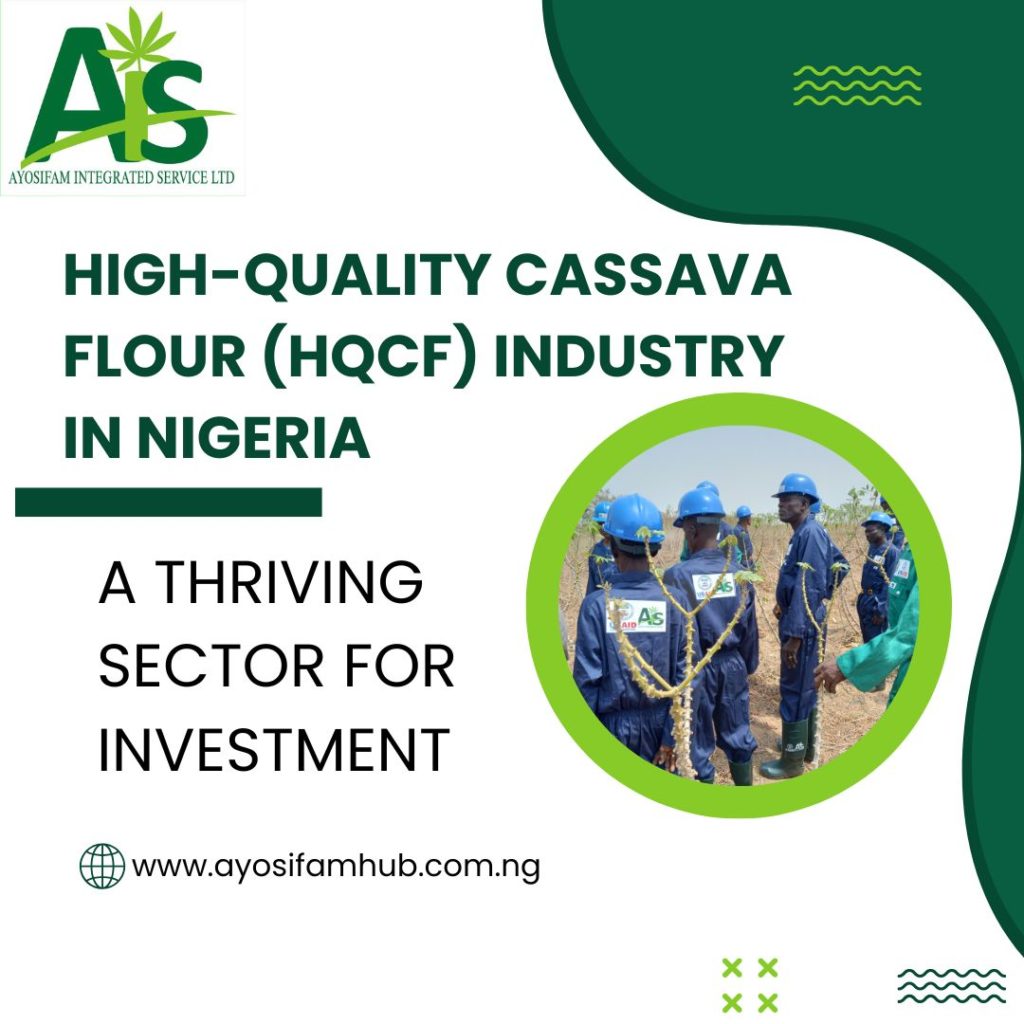Nigeria, the world’s largest producer of cassava, presents a fertile ground for the burgeoning High-Quality Cassava Flour (HQCF) industry. Several converging factors have created a thriving ecosystem for HQCF production, making it an attractive sector for investors.
Factors Driving the Success of HQCF in Nigeria:
Abundant Raw Material Supply: Nigeria’s position as the top cassava producer globally ensures a readily available and relatively inexpensive supply of fresh cassava roots, the primary input for HQCF production. This abundance mitigates raw material sourcing challenges and contributes to cost-effectiveness.
Government Support and Policies: The Nigerian government is actively promoting the cassava value chain as part of its efforts to diversify the economy, reduce import dependence (particularly on wheat flour), and enhance food security. Initiatives and policies supporting cassava production and processing provide a favorable environment for HQCF factories. Recent examples include the Federal Government’s backing of large-scale cassava production and agro-processing ventures like Agbeyewa Farms.
Growing Industrial Demand: HQCF is increasingly recognized as a versatile raw material with wide-ranging applications in the food and non-food industries.
Food Industry: HQCF is used as a composite flour in bread, confectionery, pasta (spaghetti, macaroni, noodles), and as a thickener in soups and sauces. It also serves as a filler and binder in products like seasoning cubes. Research indicates that HQCF can substitute wheat flour in bakery products by 10% to 35%.
Non-Food Industry: Industrial-grade cassava flour finds applications in the production of paper, paint, soap, and adhesives.
Import Substitution Potential: With Nigeria importing significant quantities of wheat flour annually, HQCF presents a viable and cost-effective alternative, conserving foreign exchange and bolstering the local economy. The annual national demand for industrial cassava flour is estimated at a substantial 750,000 metric tons, while local production currently meets only a fraction of this demand, highlighting a significant market gap.
Nutritional Benefits and Gluten-Free Alternative: HQCF offers a gluten-free alternative to wheat flour, catering to the growing health-conscious consumer segment and individuals with dietary restrictions.
Potential for Value Addition and Export: Processing fresh cassava into HQCF significantly reduces post-harvest losses, lowers transportation costs, and extends the shelf life of the raw material. Furthermore, there is a growing potential for Nigeria to become a significant exporter of HQCF, tapping into the global demand for cassava-based products.
Rural Economic Development: The establishment of HQCF factories in rural communities creates employment opportunities, boosts local economies, and enhances the livelihoods of cassava farmers through reliable offtake agreements.
Why Investors Should Look at the Nigerian HQCF Sector:
High Market Demand and Untapped Potential: The significant gap between the national demand for HQCF and the current local supply presents a substantial market opportunity for investors. As industries increasingly adopt HQCF as a cost-effective and locally sourced raw material, demand is set to rise further.
Strong Profitability: Studies indicate that HQCF processing is a profitable venture in Nigeria, with attractive gross and net processing margins. While profitability can be influenced by factors like energy costs and raw material pricing, efficient management and access to stable supply chains enhance returns.
Government Incentives and Support: Investors in the agro-processing sector, including HQCF production, can benefit from various government incentives, grants, and support programs aimed at promoting agricultural development and industrialization.
Versatile Applications and Diversified Revenue Streams: The wide range of applications for HQCF in both the food and non-food sectors provides investors with diversified revenue streams and reduces reliance on a single market.
Social Impact and Sustainability: Investing in HQCF factories contributes to rural economic development, job creation, and the empowerment of local farmers. Utilizing a locally sourced raw material like cassava also promotes sustainable agricultural practices and reduces the carbon footprint associated with imported products.
Challenges to Consider:
While the HQCF sector in Nigeria holds immense promise, potential investors should also be aware of certain challenges:
Price Competitiveness with Wheat Flour: HQCF needs to be competitively priced compared to imported wheat flour to encourage widespread industrial adoption, particularly in the bakery and confectionery industries.
Raw Material Supply Chain Management: Ensuring a consistent and reliable supply of high-quality cassava roots at stable prices is crucial for efficient factory operations. Issues such as seasonal variations and transportation logistics need careful consideration.
Energy Costs and Infrastructure: Inadequate infrastructure, particularly power supply, can lead to high energy costs, impacting the profitability of processing plants. Investing in alternative energy sources may be necessary.
Quality Standards and Processing Technology: Meeting the required quality standards for HQCF for various industrial applications necessitates investment in appropriate processing technology and quality control measures.
Consumer Awareness and Acceptance: While industrial demand is growing, continuous efforts are needed to raise consumer awareness and acceptance of HQCF-containing food products.
Conclusion:
The high-quality cassava flour industry in Nigeria is not just surviving; it is demonstrably thriving, driven by abundant resources, government support, increasing industrial demand, and its potential as an import substitute. While challenges exist, the significant market opportunities and the potential for strong financial and social returns make the Nigerian HQCF sector an increasingly attractive destination for investors seeking to capitalize on the country’s agricultural prowess and growing industrialization. By addressing the existing challenges through strategic investments and efficient management practices, investors can unlock the immense potential of this dynamic and impactful sector.




